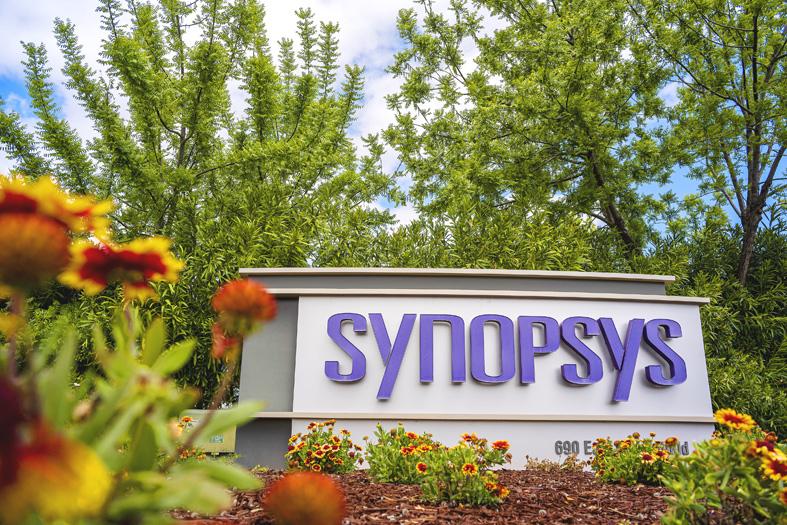Synopsys Inc, the biggest supplier of software used to design semiconductors, is under investigation by the US Department of Commerce for possibly passing key technology to banned Chinese companies, people familiar with the matter have said.
Investigators are looking into allegations that Synopsys, working with affiliates in China, provided chip designs and software to Huawei Technologies Co’s (華為) Hisilicon Technologies Co (海思半導體) unit for chip production at Semiconductor Manufacturing International Corp (SMIC, 中芯國際), said the people, who asked not to be identified because details of the process have not been made public.
US companies are barred from selling some types of technology to Huawei and SMIC because they have been designated as threats to national security by the US Bureau of Industry and Security (BIS).

Photo: Bloomberg
Synopsys in December last year disclosed that it had received a subpoena from the bureau relating to “transactions with certain Chinese entities,” without specifying when it received the request or providing further details.
At the time, the company said it was in compliance with all regulations and was working to respond to the inquiry.
Synopsys declined to comment beyond that initial disclosure.
The situation highlights the difficulties US companies are facing amid the escalating rivalry between their home country and China, which is the largest and fastest-growing market for their technology. To keep investors happy, businesses need to tap that opportunity without running afoul of increasing restrictions from regulators.
In Washington, there is a vocal lobby calling for more measures, such as the US entity list, to block Beijing’s attempts to build up its domestic chip industry, and to thwart what some see as attempts by China to use illicit means and billions in government money to achieve that independence.
For its part, China has threatened to impose its own measures on overseas companies that get in the way of its efforts, even when they are doing so to comply with new rules in the US.
California-based Synopsys and its rival Cadence Design Systems Inc dominate the market for software used to design semiconductors. Their products are essential for Chinese chipmakers trying to lead Beijing’s push to make the country more self-reliant in electronic components.
“While the department does not comment on the potential existence of investigations, BIS vigorously investigates allegations of violations of the Export Administration Regulations, including attempts to transfer controlled items or technologies to or among parties on the Entity List,” the bureau said in a statement. “Any enforcement action resulting from an investigation is made public after that investigation has concluded.”

WEAKER ACTIVITY: The sharpest deterioration was seen in the electronics and optical components sector, with the production index falling 13.2 points to 44.5 Taiwan’s manufacturing sector last month contracted for a second consecutive month, with the purchasing managers’ index (PMI) slipping to 48, reflecting ongoing caution over trade uncertainties, the Chung-Hua Institution for Economic Research (CIER, 中華經濟研究院) said yesterday. The decline reflects growing caution among companies amid uncertainty surrounding US tariffs, semiconductor duties and automotive import levies, and it is also likely linked to fading front-loading activity, CIER president Lien Hsien-ming (連賢明) said. “Some clients have started shifting orders to Southeast Asian countries where tariff regimes are already clear,” Lien told a news conference. Firms across the supply chain are also lowering stock levels to mitigate

NEW PRODUCTS: MediaTek plans to roll out new products this quarter, including a flagship mobile phone chip and a GB10 chip that it is codeveloping with Nvidia Corp MediaTek Inc (聯發科) yesterday projected that revenue this quarter would dip by 7 to 13 percent to between NT$130.1 billion and NT$140 billion (US$4.38 billion and US$4.71 billion), compared with NT$150.37 billion last quarter, which it attributed to subdued front-loading demand and unfavorable foreign exchange rates. The Hsinchu-based chip designer said that the forecast factored in the negative effects of an estimated 6 percent appreciation of the New Taiwan dollar against the greenback. “As some demand has been pulled into the first half of the year and resulted in a different quarterly pattern, we expect the third quarter revenue to decline sequentially,”

Six Taiwanese companies, including contract chipmaker Taiwan Semiconductor Manufacturing Co. (TSMC), made the 2025 Fortune Global 500 list of the world’s largest firms by revenue. In a report published by New York-based Fortune magazine on Tuesday, Hon Hai Precision Industry Co. (better known as Foxconn) ranked highest among Taiwanese firms, placing 28th with revenue of US$213.69 billion. Up 60 spots from last year, TSMC rose 60 places to reach No. 126 with US$90.16 billion in revenue, followed by Quanta Computer Inc. at 348th, Pegatron Corp. at 461st, CPC Corp., Taiwan at 494th and Wistron Corp. at 496th. According to Fortune, the world’s

DIVERSIFYING: Taiwanese investors are reassessing their preference for US dollar assets and moving toward Europe amid a global shift away from the greenback Taiwanese investors are reassessing their long-held preference for US-dollar assets, shifting their bets to Europe in the latest move by global investors away from the greenback. Taiwanese funds holding European assets have seen an influx of investments recently, pushing their combined value to NT$13.7 billion (US$461 million) as of the end of last month, the highest since 2019, according to data compiled by Bloomberg. Over the first half of this year, Taiwanese investors have also poured NT$14.1 billion into Europe-focused funds based overseas, bringing total assets up to NT$134.8 billion, according to data from the Securities Investment Trust and Consulting Association (SITCA),